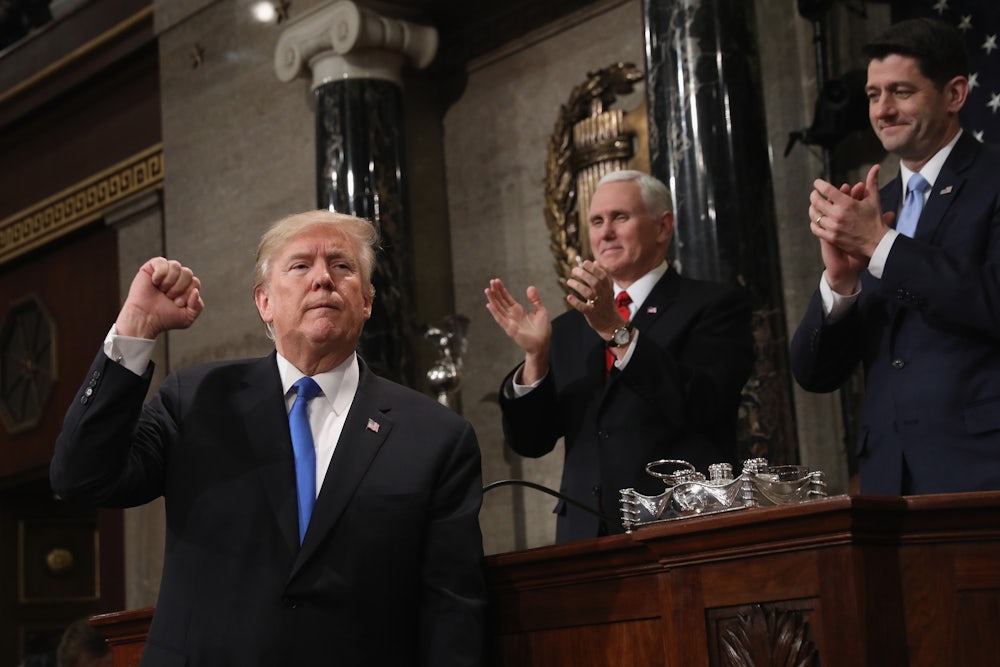Speaking with journalists a few hours before his State of the Union speech, President Donald Trump harped on the theme of national unity. “I want to see our country united,” he said. “I want to bring our country back from a tremendous divisiveness, which has taken place not just over one year, over many years, including the Bush years, not just Obama.”
These are unexpected words from a president who rose to power through the politics of polarization, launching savage attacks not just on his political rivals but also entire ethnic groups. Could the man who opened his presidential campaign speaking of Mexican “rapists,” and later called for a Muslim immigration ban, really lay claim to national unity?
The address Trump delivered on Tuesday night provided a complicated answer. Throughout the speech, but especially in the first half, Trump made some genuine gestures towards national healing, reaching out to Democrats and groups he had alienated. But as the speech progressed, Trump reverted to who he’s been throughout his political career and in his presidency: eager to turn any debate into an us-versus-them fight.
When he took up the cloak of unity, Trump talked as a normal American president would, about shared national traumas and the strength of the people. He used the shooting of Congressman Steve Scalise as an example of shared humanity that transcends partisan lines:
In the aftermath of that terrible shooting, we came together, not as Republicans or Democrats, but as representatives of the people. But it is not enough to come together only in times of tragedy. Tonight, I call upon on all of us to set aside our differences, to seek out common ground, and to summon the unity we need to deliver for the people. This is really the key. These are the people we were elected to serve.
Eschewing the racism that so often infuses his politics, Trump also called on on Washington to “protect our citizens of every background, color, religion and creed.”
Yet these pious calls for togetherness were combined with discordant themes that sought to cast certain groups as alien to America—such as football players who protest police brutality by taking a knee. After telling the story of a 12-year-old boy who started a movement to place flags on the graves of veterans, Trump said, “Preston’s reverence for those who have served our nation reminds us why we salute our flag, why we put our hands on our hearts for the pledge of allegiance, and why we proudly stand for the national anthem.” This is a weaponization of patriotism, using it to divide rather than unite.
Trump also returned to his favorite demagogic theme, claiming that undocumented immigrants pose a grave threat to citizens. He highlighted American victims of immigrant criminals, and linked legal immigration to terrorism. (In fact, immigrants commit fewer crimes than native-born Americans.) He also falsely claimed that, “Under the current, broken system, a single immigrant can bring in virtually unlimited numbers of distant relatives.” This line led to groans and boos from Democrats:
Hissing and some boos in the chamber as the president says “chain migration” allows people to bring in a “nearly unlimited” number of extended family
— Kasie Hunt (@kasie) January 31, 2018
His proposal would limit family-sponsored migration to spouses and minor children
Because it's not true. A single immigrant cannot bring in an unlimited amount of family members. There are no visas for aunts/uncles/cousins/grandparents. And some need to wait decades to reunite with one family member. ONE family member. #SOTU https://t.co/2dpjxwdMRM
— Judy Chu (@RepJudyChu) January 31, 2018
Most egregiously, Trump appropriated the term Dreamers (referring to undocumented immigrants brought to America as children) for his own nativist agenda. “My duty, and the sacred duty of every elected official in this chamber, is to defend Americans, to protect their safety, their families, their communities, and their right to the American dream,” Trump said. “Because Americans are dreamers, too.” Using “dreamers” in this way is not unlike saying “white lives matter.” David Duke, a former Grand Wizard of the Ku Klux Klan, and alt-right leader Richard Spencer both picked up on the dog whistle:
Thank you President Trump. Americans are "Dreamers" too.
— David Duke (@DrDavidDuke) January 31, 2018
“Americans are dreamers, too.”
— Richard 🐉 Spencer (@RichardBSpencer) January 31, 2018
~Donald Trump pic.twitter.com/nZmUFBWMCE
Duke and Spencer’s approval speaks volumes about whom Trump’s speech was truly intended for: the same Americans who voted him into office based on his ethnonationalist agenda. Despite the mask of unity that Trump wore at the beginning, in the end he proved to be the same president he’s always been: the chief promoter of the nation’s “tremendous divisiveness,” rather than the solution to it.
